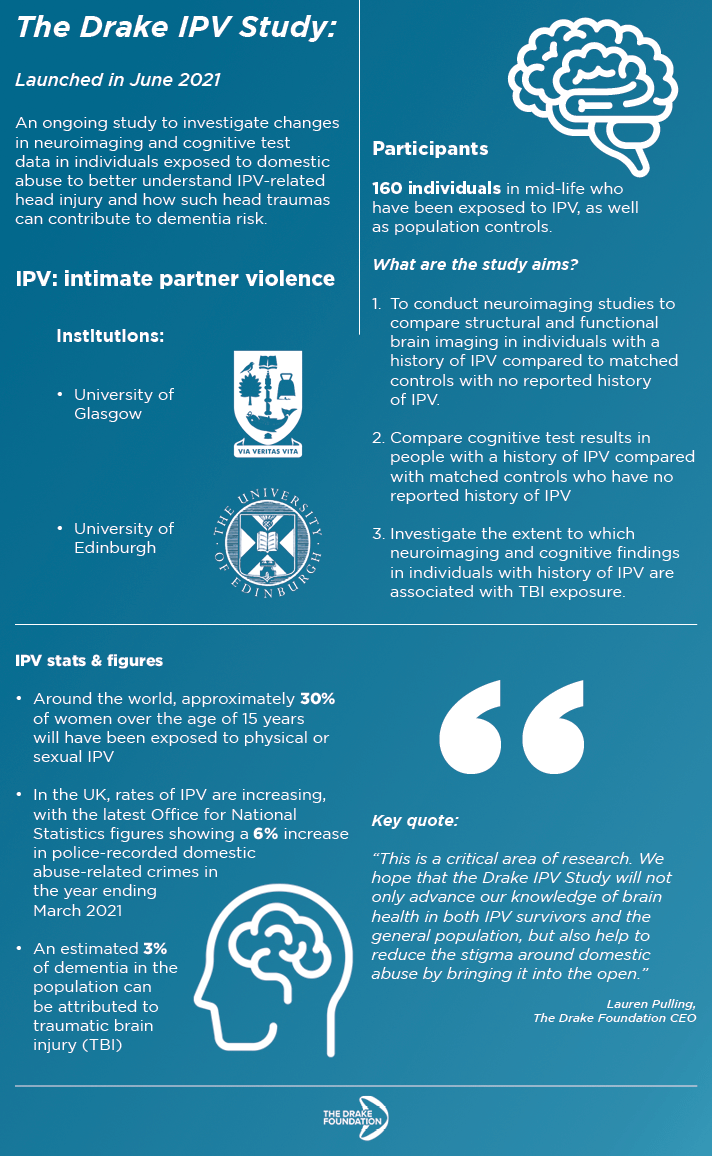Intimate partner violence
Intimate partner violence (IPV) is one of the most common forms of violence against women. The World Health Organisation has identified three main types of intimate partner violence: physical, sexual and emotional. It occurs on a global scale and isn’t constrained to socioeconomic, religious or cultural demographics. Within the UK, rates of IPV are increasing, with the latest statistics from the ONS showing a 6% increase in police-recorded domestic abuse-related crimes in England and Wales in the year ending March 2021, equivalent to 845,673 cases. On a global scale, approximately 30% of women over age 15 years will have been exposed to physical or sexual IPV.
Whilst injuries can take various forms, both physical and psychological, many individuals exposed to IPV report a history of traumatic brain injury.
To investigate the long-term effects of such head injuries, in June 2021 The Drake Foundation funded and launched the Drake IPV Study, in association with the University of Glasgow and the University of Edinburgh.
The Drake IPV Study
In June 2021, The Drake Foundation awarded funding to The Drake IPV Study to investigate changes in neuroimaging and cognitive test data in individuals exposed to domestic abuse and compare these with population controls with no reported history of abuse, in order to better understand IPV-related head injury and its contribution to dementia risk.
The study, currently ongoing, is being led by Principle Investigators Professor William Stewart, Professor Craig Ritchie and Dr Graciela Muniz-Terrera, from the Universities of Glasgow and Edinburgh.
A total of 160 individuals in mid-life who have been exposed to IPV will take part in the study, alongside a similar-sized population control group. The principle aims of the study are to compare brain imaging in individuals with a history of IPV to matched controls with no reported history of IPV; to compare cognitive test results in people with a history of IPV with those with no reported history of IPV; and to better understand the levels of association of traumatic brain injury (TBI) exposure in those individuals with history of IPV.
Since the launch of the study, the study team have presented at a number of conferences, including Neurotrauma 2022 (Atlanta, USA), whilst BBC News Scotland have also covered the study.
Please refer to our study page and social media channels for updates on the Drake IPV Study and publications resulting of the study.

Other prominent studies
Beyond our research, there are a handful of other studies that are seeking to understand the link between IPV-related head injury and brain health. In the US, the ENIGMA Intimate Partner Violence Working Group aims to examine the effects of IPV-related head trauma, collaborating with social workers, clinicians and domestic violence agencies to provide recommendations for key clinical research questions. More information on the working group can be found in published in Brain Imaging and Behaviour.
The project is part of a wider ENIGMA Brain Injury study that will combine data from 10 subgroups alongside intimate partner violence, including various acquired traumatic brain injuries and sports-related concussion.
In 2022, a research team from the University of South Australia published a paper titled Intimate Partner Violence and Risk for Mortality and Incident Dementia in Older Women, which aimed to “assess the long-term risk for mortality and incident dementia associated with exposure to intimate partner violence (IPV) at any time over the life course”. The study concluded, amongst other findings, that “older women who self-report exposure to IPV over the lifespan die significantly earlier than women who do not”.
Also in 2022, a research team from institutions including the University of Calgary and McMaster University, Ontario, published a study titled Prevalence and Perception of Intimate Partner Violence-Related Traumatic Brain Injury. The study reported that 29.2% of participants indicated a “high potential of lifetime IPV-related TBI, most commonly from being hit in the face or head”. The study also called for the implementation of IPV screening in communities to better understand “the potential scope of TBI”.
A study supported by the National Center for PTSD (USA), titled Neural Correlates of Traumatic Brain Injury in Women Survivors of Intimate Partner Violence: A Structural and Functional Connectivity Neuroimaging Study, aimed to “provide a preliminary investigation of the effect of TBI in women who experience IPV”, concluding that “significant differences in brain structure and connectivity were observed in individuals with IPV and TBI”.
The Drake IPV Symposium: a call for action on domestic violence
The inaugural Drake IPV Symposium was held at Woburn House on 29th November 2022, bringing together leading minds in tackling IPV and its long-term effects on brain health.
Intended to bridge the gap between research, practice and policy and to equip policymakers with an insight into the potential long-term brain health impacts of IPV, the symposium provided a forum for discussion among delegates.
 Featuring a series of research updates from some of the world’s leading academics, including Professor Willie Stewart, Dr Eve Valera (Harvard Medical School, USA) and Dr Carrie Esopenko (Icahn School of Medicine at Mount Sinai, USA), the meeting also heard powerful testimony from broadcaster and writer Liz Fraser, speaking about her personal experience of IPV.
Featuring a series of research updates from some of the world’s leading academics, including Professor Willie Stewart, Dr Eve Valera (Harvard Medical School, USA) and Dr Carrie Esopenko (Icahn School of Medicine at Mount Sinai, USA), the meeting also heard powerful testimony from broadcaster and writer Liz Fraser, speaking about her personal experience of IPV.
The meeting ended with an address from Jess Phillips MP, Shadow Minister for Domestic Violence and Safeguarding, and highlighted the need for action and the stark contrast between progress in awareness and understanding of brain injuries and lifelong brain health in sport compared to the relative neglect these issues have received in IPV.
To address this, delegates were in unanimous agreement that there is a need for immediate action, with the challenge set to return in a year and share progress. Find out more about the Drake IPV Symposium here.
Where can I find more information?
- Read more about our ongoing Drake IPV Study on our research page
- Learn about the Drake IPV Symposium here
- Learn more about The Drake Foundation and our other ongoing projects
- Follow The Drake Foundation on Twitter for the latest information on all our studies, including the Drake IPV Study.
- Learn more about intimate partner violence, domestic violence and domestic abuse via the NHS and GOV UK.
The Drake Foundation cannot provide advice to those exposed to intimate partner violence, but there are many different organisations that can help you. If you are based in the UK, find more information on how to access help and advice here.